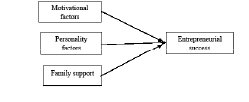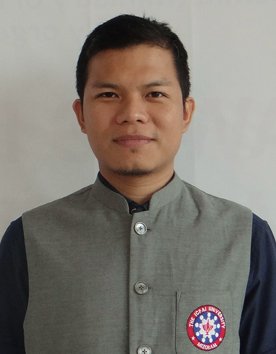

Abstract : This paper focuses on investigating factors contributing to the success of fashion designing entrepreneurs. In this regard, three constructs viz. motivational factors, personality factors and family support factors were generated and hypothesised from the extensive literature review. The main purpose of this paper is understanding to what extend the motivational factors, personality factors and family support factors are able to elaborate its role towards the success of women fashion designers in Aizawl. The analysis undertaken shows that all of these three constructs have significant contribution towards the success of a fashion designing entrepreneurs. Thus, the latter part of the paper emphasizes on an enriching conclusions and suggestions which were believed to enhance entrepreneurship among women across the globes.
Keywords: Women entrepreneurs, fashion designers, Success factors, Personality factors, motivational factors, family support
Introduction
With the emergent importance of entrepreneurship for the economic prosperity of a country, women are also encouraged to be involved by starting their own enterprise. To strengthen the status, standard of living and prosperity, women are capable of taking up the risk of starting an enterprise by tapping different sectors where they have an expertise, skills as well as interest. Among such sectors tapped by women, fashion industry is one of the most vibrant sectors where women across the world have enjoys success and stand up as renowned fashion designers having their own label and ruled the fashion world of a country, city and region where their business operates. North East India in general is known for its amazing fashion sense and among the sisters of North East India, Aizawl (Mizoram) has just about the best in fashion and accessories. Innovative ideas of show casing stuff to flea markets that have so much to offer, from shoes to accessories to clothes.
Aizawl specifically have a few fashion designers who are taking over the whole Aizawl market with their label and change the fashion tastes & preferences of the Mizo’s with every piece of designs they introduce over a period of time. They have the capacity to take over the market and enjoy supreme success. The success of fashion designers as women entrepreneurs was believed to be influenced by several factors and besides, factors influencing an entrepreneurial success have been an important research domain.
Attending a church service for every Sunday, the Mizo women would wear only a formal top imported from Bangkok, china and other country until the 3 Mizo sisters have founded Vakiria Computerised Embroidery in 2005 marking a new trend for lady’s formal wear. They are the pioneers in designing affordable Sunday fashion and bridal fashion along with the establishment of Vakiria Institute of Fashion Designing (VIFT). Since its inception, Vakiria has changed the fashion tastes of the Mizo people, persuading them to prefer the local branded formal wear replacing the western tops which helps in creating a conducive environment for women to enter the fashion designing business.
Following the trends, many successful designers have been produced by VIFT and other institutions who have their own label produced from Aizawl and sold out not only in Mizoram but exported to different states of India and foreign countries. Therefore, the study intends to explore the success factors of women entrepreneurs in Aizawl by focusing on the influence of motivational factors, personal factors and family support on the success of selected fashion designers.
Literature Review and Hypothesis Building
Motivational factors:
The term motivation simply means the causes that inspire the people to do something. Entrepreneurial motivational characteristics are formed through a combination of various social, economic and psychological factors to which the person becomes subjected to right from childhood. Entrepreneur’ personal characteristics, such as need for achievement and need for cognition, have positive impact on firm performance, (Zhang and Bruning, 2011). However, the most important psychological factors judged by entrepreneurs to be related to success were the energetic participation in the endeavour, self-confidence, desire for being one’s own boss, achievement need, liking of work, common sense and tenacity (Hornaday and Bunker,1970). On the basis of the above literature, it is hypothesized that
Hypothesis 1: There is a significant relationship between motivational factors and success of fashion designing entrepreneurs
Personality factors:
Personality is often been shaped by the education of a person. Regardless of the profession, similarly within the context of entrepreneurship the success of any business operation is very much associate with the training and education experiences that someone had involved. In order for the entrepreneur to be successful, the related knowledge that had been accumulated is assumed to be always the key success that can affect their business performance, which will further support the business growth and certainly has positive impact on sustaining the survival of a business (Siti Haryati Shaikh Ali et al., 2004). Thus, the importance of education in shaping, promoting, and ensuring success of business will remain intact (Lavoie, 1985). On the basis of the above literature, it is hypothesized that
Hypothesis 2: There is a relationship between personality and success of fashion designing entrepreneurs.
Family support:
Another important dimension that act as the main motivational factors for promoting successful women entrepreneur could be the support of family members. The circle of family members that provide supports and assistances varies accordingly to the age groups of the entrepreneurs themselves (Rashid et. al, 2015). According to Brindley (2005), the main factors which support the successful women entrepreneurs comes from family and friends. So, family and close friends play a very important part in ensuring the emotional stability of women entrepreneurs. These groups of associate members normally have the capacity to provide lessons and guidance in the business sectors that they had experienced earlier. On the basis of the above literature, it is hypothesized that
Hypothesis 3: There is a relationship between family support and success of fashion designing entrepreneurs.
Success Factors:
The simplest definition of success is equivalent to continued business operations and the opposite, failure, means going out of business (Rashid et al., 2015). The reasons of successful women entrepreneurs are due to their personal qualities. The most important personal qualities required to become successful women entrepreneurs in Kelantan are self-reliance, exploit opportunities, innovative, creativity, willingness to take chances, personal drive, communication skills, people skills, web thinking, good negotiation skills and possess can do attitude in overcoming obstacles. Due to these qualities, they are able reach the targets and achieve their goals and be successful (Norudin Mansor, 2005).

Research Methodology
Sample selection
The study was conducted in city of Aizawl, Mizoram (India). The population of the study includes all the fashion designer women entrepreneurs in Aizawl. The total population arrived at 35 fashion designer women entrepreneurs who happens to have their own retail outlet, who runs their business successfully with a label/brand name and who manage an official social media account in the name of their brand/label have been selected for the study on the basis of convenience sampling. Table 1 represents an overview of fashion designing entrepreneurs.
Table 1: An overview of the fashion designing entrepreneurs
Table is not available due to technical problem
Data collection and generation of scale items
The study used consumer survey as a tool of collecting primary data. A comprehensive questionnaire was developed and was finalized after reviewing of existing literature such as Makbul and Hasun (2011) Ummah and Gunapalan (2012), Kusumsiri and Jayawardane (2013), Rashi et. al (2015). To measure the attitudes of the respondents, Likert five-point scale have been used where 1 stands for strongly disagree, 2 for disagree, 3 for neutral, 4 for agree and 5 for strongly agree. The self- designed questionnaire comprising of demographic profile and Likert scaled questions having 19 statements under 4 sections namely motivational factors, personality factors, family support and success factors were administered to the fashion designers and they were mostly contacted at the outlet based on their conveniences. Data was collected during April-May 2018. In addition to primary data, the secondary data are gathered from books, journals, reports, governmental organizations, magazines, websites and business houses.
Demographic profile of the respondents
Table 1: Demographic profile of the respondents
Table is not available due to technical problem
The demographic profile of the respondents comprising of four categories was revealed in table 1. The analysis of the data revealed that 42.9% of the respondents were having an average monthly income of 2 lakhs & above, 45.17% of the respondents employs 1-3 employees, 51.4 % of the respondents have fashion degree. Moreover, 85.7% of the respondents have previous work experience before starting their own enterprise.
Results
Before analysing the data, exploratory factor analysis has been applied for data reduction or data purification. Principal component analysis with varimax rotation was run for summarizing the data which began with anti-image correlation matrix, checking the communalities by deleting the value of less than 0.5, followed by inspecting rotated component matrix where double loaded variables with a value less than 0.5 were deleted. The statements from the four constructs with factor loading of 0.5 and with eigen value greater than 1 are considered for the analysis. Data purification have reduced the motivation factors into three statements explaining about 74.05% of the total variances. Personality factor was reduced into three having the acceptable factor loading which explained about 67.13% of the total variances. Family support factor was purified into three statements explaining about 69.05 % of the total variances. Finally, success factors were reduced into three where this construct explains about 75.80% of the variation.
Table is not available due to technical problem
Testing of hypotheses
Table 3: Summary of hypotheses
Table is not available due to technical problem
For testing of hypotheses, regression analysis was employed. The positively significant regression coefficient of .496 with a p-value of .002 revealed that there is a significant relationship between motivational factors and success of fashion designing entrepreneurs. Thus, the hypothesis 1 is accepted. The positively significant regression coefficient of .375 with a p-value of .000 revealed that there is a significant relationship between personality factors and success of fashion designing entrepreneurs. Thus, the hypothesis 2 is also accepted. Finally, the positively significant regression coefficient of .782 with a p-value of .000 revealed that there is a significant relationship between family support and success of fashion designing entrepreneurs. Thus, the hypothesis 3 is also accepted.
Conclusion and Suggestions
Existence of numerous researches on factors influencing the success of entrepreneurs shows the need and importance of identifying which factors leads to the entrepreneurial success in terms of profit, achievement and survival in the long run. However, research on identifying success factors specifically for fashion designing entrepreneurs is at an early stage (Kusumsiri and Jayawardane, 2013). Therefore, this paper investigates the relationship between several factors viz. motivational factors, personality factors and family support influencing the success of fashion designing entrepreneurs. Hence the study finds the existence of significant relationship between motivational factors and the success of fashion designing entrepreneurs, therefore we can conclude that a woman who is internally motivated to start a business that she is interested in starting a business will primarily put in more effort and time to make it a success. She is pulled to be independent, to be her own boss and to achieve something in her life which are considered as the motivational factors in this study.
Personality factors such as creativity, innovativeness, sincerity, and commitment to continue the business despites many ups and downs are found to be the important factors influencing the success of fashion designer women entrepreneurs in Aizawl. Thus, an entrepreneur must develop and possess the quality of creativity, innovativeness, sincerity and commitment which are the important ingredients for the success of any enterprise.
Moreover, family support in terms of business operations, financial and moral support is an important factor which influence the success of fashion designer women entrepreneurs in Aizawl. Thus, the study suggest that family must do anything to support their daughter, sister, mother who have the potential and capability to undertake the risk. Financial insecurity, household responsibilities, social expectations, etc must be overcome in the best possible ways to ensure the emotional stability of women entrepreneurs.
For an entrepreneur to be successful, the study finds that educational background has some level of contribution, thus, the related knowledge that had been accumulated is assumed to be always the key success that can affect their business performance, which will further support the business growth and certainly has positive impact on sustaining the survival of a business Therefore, women must be encourage to take up educations to reach and soar high, to be confident, to be economically independent and most importantly to become a successful entrepreneurs.
Works Cited:
- Brindley, C. (2005). Barriers to women achieving their entrepre neurial potential: Women and risk. International Journal of Entrepreneurial Behaviour and Research, Vol 11, No. 2,pp 144-161.
- Borah, Jahnabee (2019), Streetstyle in Aizawl, retrieved on 1st May, 2020 from https://thevoiceoffashion.com/fabric-of-in dia/inside-northeast/street-style-in-aizawl-2597
- Chandra, R.K. (1991). Entrepreneurial success: A psychological study. Sterling, New Delhi, India.
- Desai, V. (2001). Dynamics of Entrepreneurial Development and Management, Himalaya Publishing House, New Delhi.
- Fanai, Ezrela Dalidia (2019), Meet the three sisters taking Mizoram Fashion Industry by storm, retrieved on 1st May, 2020 from https://www.eastmojo.com/mizoram/2019/09/10/meet-the- 3-sisters-taking-mizoram-fashion-industry-by-storm
- Hornaday JA and Bunker CS (1970), “The Nature of the Entrepre neur”, Personal Psychology, Vol-23, pp 47-54
- Kusumsiri, Nisanka and Jayawardane, AKW (2013). Factors influ encing success in fashion designer entrepreneurship in Sri Lanka. National engineering, University of Moratuwa, Sri Lanka.
- Lavoie, D. (1985) “A new Era for Female Entrepreneurship in the 80’s”, Journal of Small Business – Canada, Winter: Vol 2, No 3,pp 34-43.
- Makhbul, Z.F (2011), “Entrepreneurial success: An Exploratory Study among Entrepreneurs”, International Journal of Business and Management, Volume 6, No. 1, pp. 116-125.
- Norudin Mansor (2005), “Woman in Business: Determinants for Venturing in Malaysian SMEs”, Studia Universitas Babes- Bolyai, Negotia, No.2.
- Pandey, Vivekananda (2011), “An analytical study of Entrepreneur ial success factors in Uttar Pradesh”, Asian Journal of Tech nology & Management Research, Vol.1, No.1, pp. 1-24.
- Rashid KM, Ngah H.C, Mohamed Z and Mansor N (2015), “Suc cess factors among women entrepreneur in Malaysia. Inter national Academic Research in Malaysia”, International Re search Journal of Business and technology Vol.1, No.2, pp. 28-36.
- Siti Haryati Shaikh Ali, Norudin Mansor, Norsidah Ahmad and Zai ton Ahmad (2004) Empirical Investigation of factors that Motivate Women Entrepreneurship, 3rd International Con ference on SMEs in a Global Economy, Subang, Selangor, Malaysia, 6-7July.
- Ummah, M.A.C. Salfiya &. Gunapalan, Dr. S (2012), “Factors influ encing on entrepreneurial success: An empirical study on women headed families in Ampara and Batticaloa Districts in Sri Lanka”, International Journal of Business, Economics and Law, Vol. 1, pp 141-148.
- Zhang,Di David and Bruning, EdwardR (2011), “Personal charac teristics and strategic orientation: Entrepreneurs in Cana dian manufacturing companies”, International Journal of Entrepreneurial Behavior and Research, Vol 17, No 1, pp 82-103.
Cite the original source:
Vanlalhriati, Corolyn and Lalropuii. “Success Factors of Women Entrepreneurs : An Exploratory Study on Fashion Designers in Aizawl, Mizoram.” Mizo Studies, X, no. 4, Dec. 2021, pp. 742–754.
![]()










